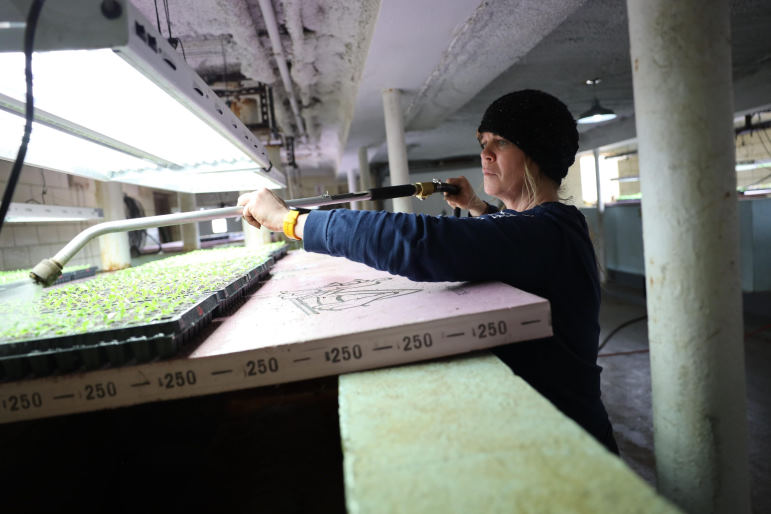Grow-Your-Own Movement Blooms in Wisconsin
From Hunger Task Force's farm to CSA efforts across the state.

Sarah Bressler, Farm Manager, waters lettuce seedlings at the Hunger Task Force Farm in Franklin, Wis., on March 1, 2022. The nonprofit organization distributes the produce to food pantries, homeless shelters, low income senior living sites and soup kitchens. (Coburn Dukehart / Wisconsin Watch)
Sarah Bressler fell in love with growing food during an internship in urban farming her senior year of college. Now, she is the farm manager at the Hunger Task Force based out of Milwaukee, where she manages a 208-acre farm that provides half a million pounds of produce to its food bank each year.
The core labor force of The Farm is roughly 5,000 volunteers who pass through each season, and they, along with a full-time staff, grow about two dozen different fruits and vegetables, Bressler said.
“It’s a form of a greenhouse, but it’s in the fields,” she explained. “So it’s literally surrounding the growing space, so you’re actually still growing in the ground, but you have a structure around the growing space that has plastic wrapped on the top of it.”
The Farm is part of a growing local food movement in Wisconsin aimed at supplying healthy, high-quality fruits, vegetables and meat — hearkening back to an earlier time when nearly all food was produced locally.
The movement includes farmers markets, urban farming initiatives, community supported agriculture and food banks that provide local produce and, increasingly, offer programs aimed at meeting the needs of the 1 in 12 Wisconsinites who are food insecure.
Always growing season in the hoop house
During a February visit to the hoop houses, the temperature was 32 degrees outside, but a steamy 80 degrees inside, providing the necessary climate for spinach, carrots, collard greens and mustard greens to grow.
Still, the hoop houses are no replacement for the bounty of a summer harvest.
“It’s obviously a lot less,” explained Bressler, referring to the winter and early spring harvests, “but at the same time, we are still able to supply those fresh fruits and vegetables, and the hoop houses also give us an extension even in the spring.”
“Almost half of children don’t have enough to eat, let alone the right vitamins and minerals and nutrients that they need to grow and to use their brains in school,” she said.
“When they go to see a food pantry and they’re picking out their collard greens, they’re excited about leaving there and making something with them,” Bressler added. “There’s dignity there.”
Creating affordable CSAs
Before the U.S. food system nationalized, people spent the summer and fall canning vegetables and stockpiling potatoes. Now large farms grow food year round in temperate climates like California’s Central Valley and ship it to grocery stores across the country.
Lydia Zepeda, a former University of Wisconsin-Madison professor and an expert on sustainable food movements, said most government agriculture policies do not support small, local farms, many of them passed down within families. This makes it unaffordable for almost anyone outside of large corporations to start a farm.
Local grow-your-own movement blossoms in America’s Dairyland was originally published by Wisconsin Watch
-
Wisconsin Lacks Clear System for Tracking Police Caught Lying
 May 9th, 2024 by Jacob Resneck
May 9th, 2024 by Jacob Resneck
-
Voters With Disabilities Demand Electronic Voting Option
 Apr 18th, 2024 by Alexander Shur
Apr 18th, 2024 by Alexander Shur
-
Few SNAP Recipients Reimbursed for Spoiled Food
 Apr 9th, 2024 by Addie Costello
Apr 9th, 2024 by Addie Costello



















